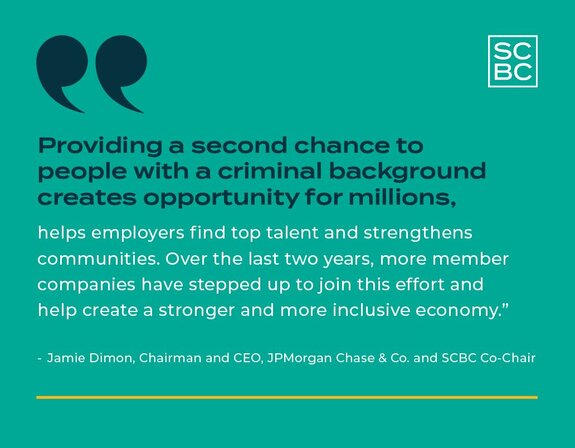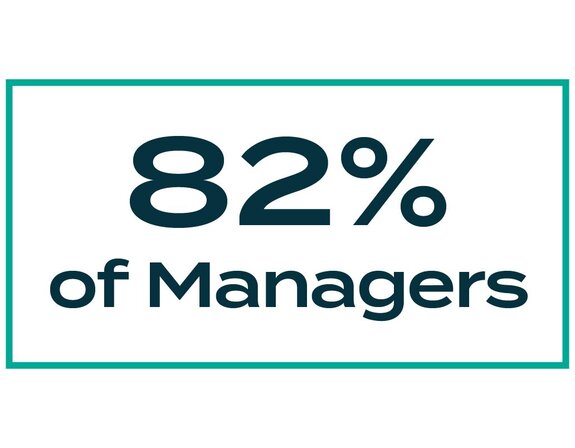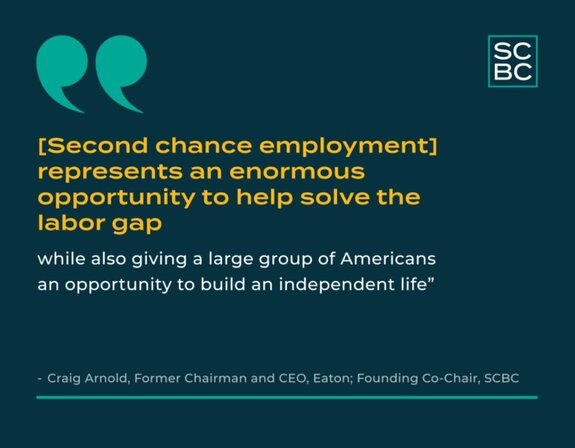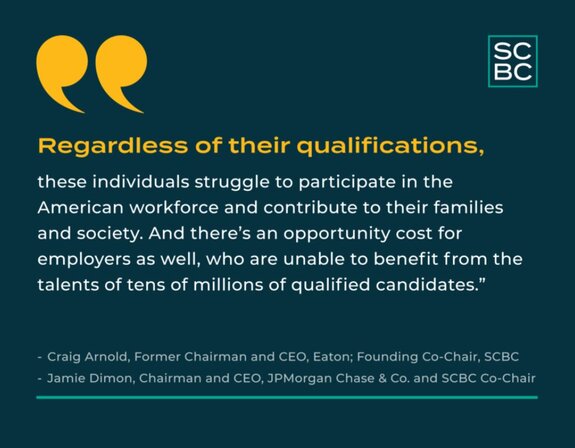Why It Matters
Large employers are increasingly adopting second chance employment programs. Learn why CEOs are tapping this source of talent and delivering for their companies and the communities where they operate.
Second Chances deliver for employers and employees.
Nearly 80 million Americans, roughly a quarter of the U.S. population, have a criminal record.
In a hypercompetitive economy, where companies struggle to identify strong candidates at all levels of their operations, too many employers are missing out on talent within this huge segment of the U.S. population. By tapping into this pool of talent, companies can access a significant number of qualified applicants who may otherwise be overlooked due to their criminal history alone.
Second chance employment, the practice of offering fair and equal job opportunities to individuals with criminal records, delivers not only a smart workforce development strategy, but provides a range of benefits to employers, employees and society as a whole.


Unfortunately, employers have put up barriers to accessing this pool of talent.
Research shows that nearly nine in 10 employers require applicants to undergo a background check, and a criminal record can reduce the chances of a second interview by 50 percent. This is one reason why nearly 75 percent of people who were formerly incarcerated remain unemployed a year after being released, according to the 2022 White House Proclamation on Second Chance Month.
To address barriers to employment opportunities, companies across a wide range of industries, including complex and highly regulated sectors, are increasingly establishing successful second chance employment policies and practices that allow them to build a more effective and resilient workforce for the future.
Second chances benefit the workplace.
Second chance employment practices have proven to be a beneficial talent strategy for employers across various industries.
According to research from the SHRM Foundation, 85 percent of human resource (HR) professionals and 81 percent of business leaders report that individuals with criminal records perform the same as, or better than, employees without criminal records.
Furthermore, 82 percent of managers and 67 percent of HR professionals report that the value second chance employees bring to their organization is as high as, or higher than, that of workers without records.


On balance, second chance hires are highly loyal and productive employees.
SHRM Foundation research reveals that 66 percent of employees would be proud to work for an organization that offered training, guidance or mentorship opportunities to people with criminal records to facilitate their return to work. What’s more, many companies that have changed their culture to ensure second chance employees can succeed are finding that their entire workforce is now more loyal and engaged. Improved employee loyalty means lower turnover and higher-quality outputs, both of which lead to stronger company performance.
Failing to consider second chance employment practices means companies are missing out on highly valuable employees. As the business landscape evolves, second chance employees offer a means for companies to tackle labor shortages and enhance overall performance.
Second chances boost the economy.
According to research from JPMorgan Chase, employment challenges that leave individuals with a criminal record unemployed or underpaid cost the U.S. economy between $78 and $87 billion every year.
Conversely, delivering meaningful second chance employment opportunities can yield far reaching positive impacts on the broader American economy. With second chance employment, businesses can tap into an extensive and rich talent pool that is too often overlooked, while addressing the societal need for broader economic participation.
Greater economic participation makes it possible for individuals and families to strengthen their financial health and for communities to stabilize.
This ripple effect leads to thriving communities, which, in turn, creates a favorable business climate for the companies operating within them.


Ultimately, second chance hiring starts with an open mind on the part of the CEOs and their HR and talent management leaders.
It then takes a commitment to a more objective approach to risk and a recognition of the potential benefits. For companies that have taken this step, most find that second chance employment practices help address workforce development challenges, create a positive workplace dynamic and give them a critical competitive edge.
The Second Chance Business Coalition is taking these efforts to a new level, giving companies the connections, resources and tools they need to build and strengthen their second chance employment programs.